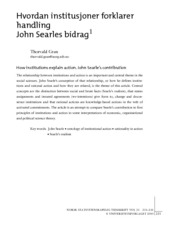| dc.contributor.author | Gran, Thorvald | eng |
| dc.date.accessioned | 2009-07-21T10:35:21Z | |
| dc.date.available | 2009-07-21T10:35:21Z | |
| dc.date.issued | 2005-03-02 | eng |
| dc.Published | Norsk statsvitenskapelig tidsskrift 2005, 21(3):211-241 | no |
| dc.identifier.issn | 0801-1745 | |
| dc.identifier.uri | https://hdl.handle.net/1956/3394 | |
| dc.description.abstract | The relation between institutions and rational action is a major theme in the social sciences. To what degree and in case how is action determined by rules? To what degree is rational action original, not to be predicted from structures in the actor's context? John Searle has over the last decade worked on the ontology of institutions and rationality. The task here is, from Searle's ontologies, to query how rational actors – in principle – relate to rules (in a broad meaning of the term). How and to what degree do institutions determine how people act? This question, in varying formats, is basic in empirical political science and organisation studies. I suggest that an answer to it is implicit in (some) micro-economic theory. The task is to compare what I interpret to be Searle's answer with (principal) answers given in some key texts in these disciplines. The analysis moves from institutions to action. Analysis in the opposite direction is as important, but not done here. | en_US |
| dc.language.iso | nob | eng |
| dc.publisher | Universitetsforlaget | nob |
| dc.subject | John Searle | eng |
| dc.subject | Ontology of institutional action | eng |
| dc.subject | Rationality in action | eng |
| dc.subject | Searle’s realism | eng |
| dc.title | Hvordan institusjoner forklarer handling John Searles bidrag | nob |
| dc.type | Peer reviewed | en_US |
| dc.type | Journal article | en_US |
| dc.rights.holder | Copyright 2005 Universitetsforlaget | en_US |
| dc.subject.nsi | VDP::Samfunnsvitenskap: 200 | nob |
